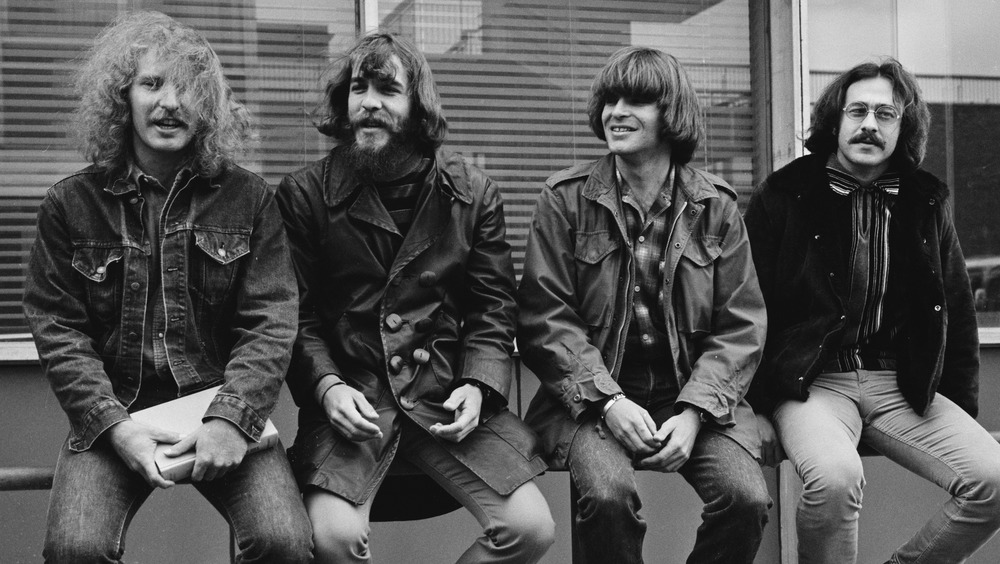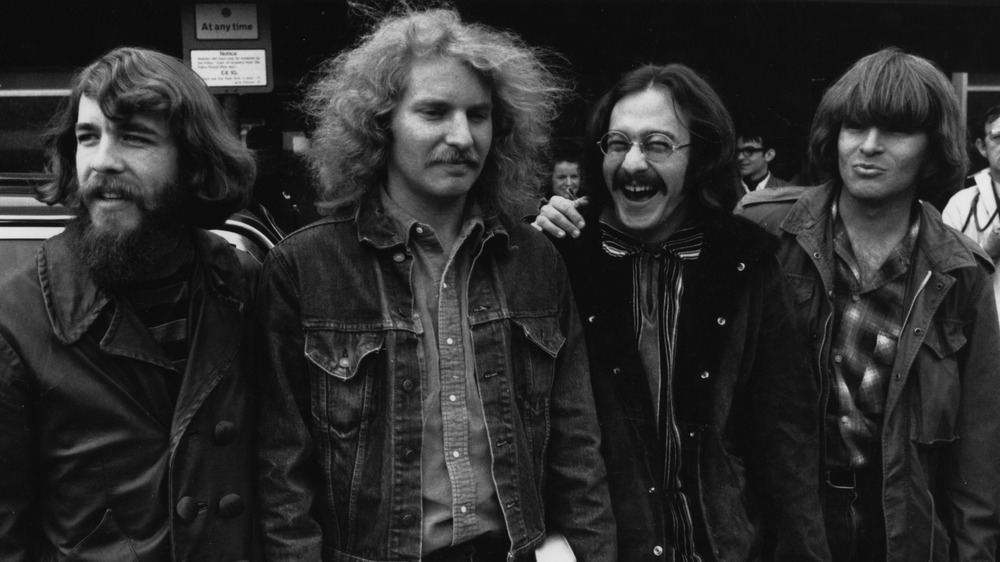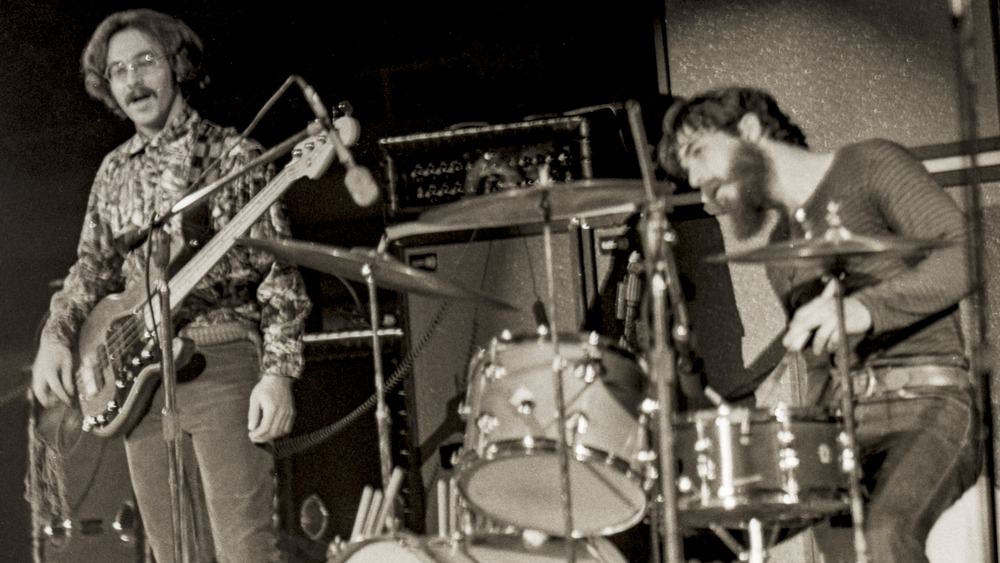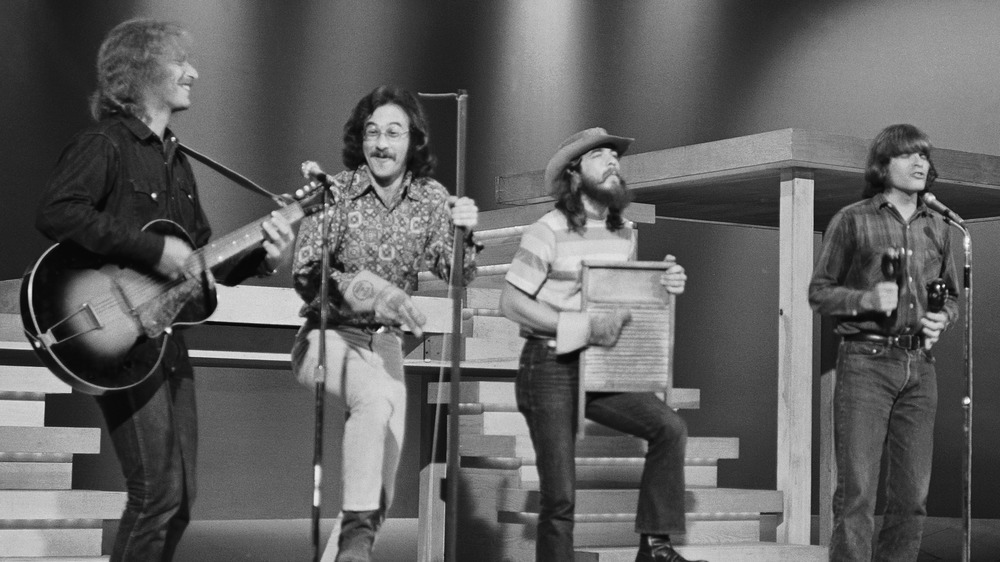The Truth About John And Tom Fogerty's Feud
For most of the late 1960s and early 1970s, Creedence Clearwater Revival was a force to be reckoned with on the pop charts. Together, brothers John and Tom Fogerty and John's high school friends Stu Cook and Doug Clifford created some of the era's most memorable hits, including "Proud Mary," "Bad Moon Rising," "Born on the Bayou," "Fortunate Son," and "Have You Ever Seen the Rain?" There seemed to be little stopping the Bay Area foursome from cranking out recordings that would become classics. In 1971, however, Tom left CCR amid growing tensions within the band, and by 1972, the remaining three members released their critically-panned final album, Mardi Gras.
Up to this day, Cook and Clifford apparently remain estranged from John Fogerty over a variety of reasons, and at the time of Tom's death in 1990, he and his younger brother were still very much at odds with each other. Yes, it's true that brotherly rivalries are a staple of rock 'n' roll history — just ask Ray and Dave Davies of The Kinks or Liam and Noel Gallagher of Oasis. But it's rare that you see things turn out as sadly as they did for the Fogerty brothers of CCR.
Tom was originally the leader of the band
Before CCR became CCR, they were known as The Blue Velvets, and later on as The Golliwogs, and during those iterations of the band, Tom Fogerty was the man in charge. As Clifford told Louder in 2012, it was toward the end of their time as The Golliwogs that John started writing songs for them, first in collaboration with his brother but eventually on his own. The drummer noted that Tom was okay with this new dynamic and that in allowing John to take the reins, he was the "ultimate team player."
With John's roles as CCR's lead singer, lead guitarist, and band leader firmly in place, the band racked up a string of hits, starting with their 1968 cover of Dale Hawkins' rockabilly classic "Susie Q." But as John penned all of the group's original songs going forward, resentment started to build among his bandmates, culminating in a tense meeting that John has always referred to as "The Night of the Generals."
'The Night of the Generals' and Tom's departure from CCR
In a 2012 interview with Uncut, John Fogerty looked back on what happened on that fateful night, which took place shortly before the recording of Pendulum, the second of two albums CCR released in 1970.
"Just before Pendulum was gonna be recorded, the other three guys called a meeting, and they insisted on a democracy –- that everybody could write songs and sing, and everybody would have a vote," he recalled, suggesting that much of the dissent was driven by his decision to do his own backing vocals on "Proud Mary" a year earlier.
John added that following Pendulum's December 1970 release, his bandmates hired a press agent and held a "huge party" where one of them was quoted as saying that they were "out from under John's tyranny." That doesn't seem to have been enough for Tom, however, who left CCR less than two weeks after Pendulum hit stores.
John explains why he and Tom feuded after CCR's breakup
Much of the acrimony between John and his former bandmates, including his brother, was caused by the singer/guitarist's strained relationship with Saul Zaentz, who headed Fantasy Records — the label that released the band's seven studio albums. As quoted by Rock and Roll Garage, John blamed Tom's decision to side with Zaentz for their inability to see eye-to-eye in the years between CCR's breakup and Tom's death.
"Tom ended up over the years evolving mentally into some sort of weird Patty Hearst syndrome," he noted. "That's what I call it when they kidnap you and you end up siding with your captors, and that's what Tom did. In some trick of mental agility, he ended up befriending Saul Zaentz against me."
While John acknowledged that he and Tom had some good times when they were younger, Tom might have been jealous of John's talent as a musician and songwriter, possibly even more so than Clifford and Cook ever were — at least, according to John.
The brothers were still estranged when Tom died
As he related in his autobiography Fortunate Son: My Life, My Music, John made an effort to mend fences with Tom for the sake of their mother. He recalled creating a list of eight issues for him and his brother to discuss, including one where Tom had supposedly filed a lawsuit against him over song ownership in 1978, but denied ever doing that. These attempts were ultimately unsuccessful, however, and it appeared to be partly because Tom was still aligned with Zaentz even as he was close to death.
"By the end of his life Tom was saying 'Saul is my best friend,'" John claimed, according to The Guardian. "He even wrote me nasty letters saying things like 'Saul and I will win.' It was very unresolved and very sad."
Tom Fogerty was only 48 years old when he passed away from AIDS-related tuberculosis on September 6, 1990. John later expressed regret at not being able to reconcile with his brother while he was still alive. The singer/guitarist stressed that he's since forgiven Tom, and that he believes he "knows it's alright, wherever he is."




